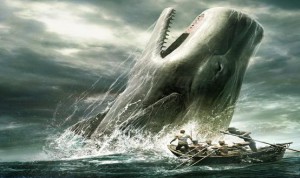I didn’t know. Several things, in fact. The story about the giant white whale and Cap’n Ahab’s crazy quest for vengeance? Based on a true story.
Not so much the tale of an obsessed whaling captain: Herman Melville made that part up. But the section of his novel about the whale attacking the ship is based on an account of the Nantucket whaler Essex, lost in the south Pacific in 1820.
It’s amazing the things that can be learned over lunch. While waiting on a table of ladies this afternoon, I was asked if I had an account of the sailing ship Essex, a title that I remembered having been in the Disasters at Sea section. (Yes: We do have an area for that specific topic…)
Nathaniel Philbrick’s 2001 recounting of the disaster is called “In the Heart of the Sea: The Tragedy of the Whaleship Essex.” It has been in and out of the shop numerous times over the years, but it wasn’t until this afternoon that I learned of the event behind the book.
After locating a hardcover copy, I carried it over the table and handed it to her. She mentioned that “this is the story that Moby Dick was based on.”
Well.
I had every reason to believe that Moby Dick was an original story, but not wanting to dispute a guest’s account, I opted to Google it. Wow.
As tough an account as is Moby Dick, the real story is positively hair-raising. Obviously, Herman Melville thought so too, because he created a wild-eyed whaling captain named Ahab in order to retell the disastrous story of the Essex and its loss at sea. In his retelling, Melville actually cleaned up the tale, a story much too gruesome to swallow. (Those of you who know the story of the Essex will please forgive my pun there… I can rarely resist cannibal puns.)
In the few minutes between the ladies’ finishing of their meal and the cash register I learned a lot about the Essex and its fate. The original account of the disaster was penned by twenty-three-year-old First Mate Owen Chase, one of the few survivors and the author of the first-hand recollection published in 1821.
After encountering a pod of whales and harpooning one, Chase noted that a whale much larger than normal was lingering nearby “acting strangely.” The stunned crew watched as the whale suddenly began swimming rapidly toward the ship, continuing its torpedo course until it rammed the wooden vessel. The whale floated next to the Essex as if injured, but moved away at last beyond the bow, but then turned back toward the ship.
“I turned around and saw him,” wrote Chase, “about one hundred rods [500 m or 550 yards] directly ahead of us, coming down with twice his ordinary speed of around 24 knots (44 km/h), and it appeared with tenfold fury and vengeance in his aspect. The surf flew in all directions about him with the continual violent thrashing of his tail. His head about half out of the water, and in that way he came upon us, and again struck the ship.”
Things went south from that point forward. Waaaaaay south.
To be specific: in the South Pacific, some two-thousand miles west of South America. That’s where the Essex sank, and the twenty sailors discussed their next course of action from their three whaleboats, the smaller craft used to chase and harpoon whales. They would be months aboard those stranded boats. Some never left. In the end, only eight crew members survived and eventually made their way back to Nantucket.
That’s where Owen Chase wrote down his recollections, which he titled “Narrative of the Most Extraordinary and Distressing Shipwreck of the Whale-Ship Essex” and published in 1821. That’s the book that Herman Melville was so taken with that he adapted it for a fictional account – Moby Dick.
Foolishly, I thought the Chase book might be so obscure as to be available for purchase at a reasonable price. It is – if you consider $13,500 a reasonable price. There is a single copy offered currently in the bookseller circles. Of course, compared to a first edition copy of Moby Dick, Chase’s book IS a bargain. Melville’s version of the story was published in 1851 and is available for a smidgen over $35,000.
Of course, you’ll find a much more affordable copy in the Literature section here at the shop with no mention of the particular details of the whaling ship Essex.
Especially over lunch.
Come visit!
McHuston
Booksellers & Irish Bistro
Rose District
122 South Main St. Broken Arrow OK!
